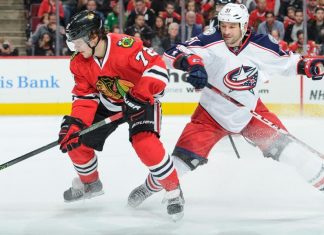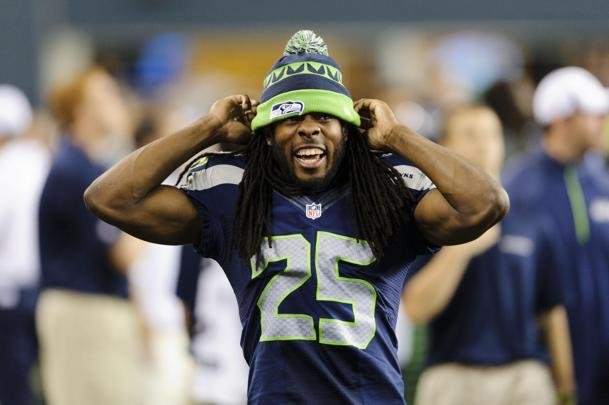RALEIGH, N.C. (AP) Rod Brind’Amour came to Carolina in 2000 and never left.
He worked his way up the Carolina Hurricanes’ organizational ladder from key trade acquisition to captain of a Stanley Cup-winning team to the front office to assistant coach and, now, head coach. Along the way, he’s become so blended into the fabric of the community that he coached his son’s T-ball team in his spare time without drawing much attention.
When he was introduced last month as Bill Peters’ successor, the Ottawa native referred to Raleigh as ”my town.”
”Obviously, I’ve been here a long time. My wife’s from here, we’ve got our families here,” Brind’Amour said. ”The organization means something to me, and wearing the crest, it’s special, and so I don’t envision myself being in the hockey world with anyone else. That’s kind of what I meant by it.
”I bleed Hurricane red,” he added.
With the NHL’s free agency period starting Sunday, Brind’Amour and the Hurricanes have something unique to sell – their new coach’s loyalty to the club and the city, and the intimate connection between the team and one of the league’s smallest markets – one that is starving for a winner. Carolina has the NHL’s longest active playoff drought, missing the postseason for nine consecutive years, and has made it only once since Brind’Amour hoisted the Cup in 2006.
Brind’Amour, who was traded here 18 years ago by the Philadelphia Flyers in the Keith Primeau deal, holds a rare position among his peers in the coaching fraternity as one of only 20 active coaches in North America’s four major professional sports who played for the team he now coaches.
”It’s special, and I think the attraction for me is that I believe in this group. … If we can just add the right pieces, I think we can be competitive,” Brind’Amour said. ”And I’ve been here when it was a great market, and we were good and had the support, so I know we can regain that.”
None of those 20 coaches have continuously been with their franchise as long as Brind’Amour. The closest comparison might be Milwaukee Brewers manager Craig Counsell, who spent his childhood in that city while his father worked in the team’s front office and has been with the club since 2007. After finishing his playing career in 2011, he moved into the front office and took over as manager in 2015 following Ron Roenicke’s midseason firing.
”Growing up here and being a fan of the Brewers, and just living here my whole life, the connection to the organization obviously means a lot,” Counsell said. ”It helps you understand the organization just because you’ve been a part of it and known it for a while. It helps you know the history; it helps you know the people. … I feel a responsibility to baseball in this state and in this city. I take that seriously.”
In addition to Brind’Amour, only three other current coaches or managers have won championships while playing for those teams: Los Angeles Lakers coach Luke Walton won two titles as a forward in the 2000s, Dallas Cowboys coach Jason Garrett was a backup quarterback on two Super Bowl-winning teams in the 1990s, and Boston Red Sox manager Alex Cora was part of that club’s World Series-winning team in 2007.
Raleigh’s small-town feel also affords Brind’Amour the chance to be a normal father. In a scene that might be hard to imagine in one of hockey’s pressure-cooker cities, Brind’Amour spent the spring coaching first base as an assistant for his son’s T-ball team in the suburb of Wake Forest.
The team’s head coach, Matt Greene, described Brind’Amour as ”an active, involved dad” and said watching him with the young players was like ”watching the magic work.
”He was talking to the kids about baseball … (and) the parents are talking about hockey, (with the parents telling him) `I’ve got my son signed up for hockey next spring,”’ Greene said. ”But Rod was talking to the kid, and putting it more on the kids. Not that Rod was the star, but the kid was the star in baseball.”
Brind’Amour, the son-in-law of former North Carolina State basketball player and ex-UNC Asheville coach Eddie Biedenbach, connected with the Raleigh community pretty quickly after his 2000 arrival, and he hopes the current players can do the same.
”We’re a younger team now, but as they get older … they’re going to see that this is a great place to raise a family,” he said. ”The people here are just friendly, they’re down-to-earth and it’s a comforting type of lifestyle. At the end of the day, we all try to be a champion and we want to be a Stanley Cup champion, but there’s other parts of life, too, that are important.
”Being a hockey player, being successful, you’ve got to feel good about where you live,” he added. ”We’ve checked that part off. Now we’ve just got to get the hockey part dialed in.”
—
AP freelance writer Charles Gardner in Milwaukee contributed to this report.
25% Bonus via Western Union























